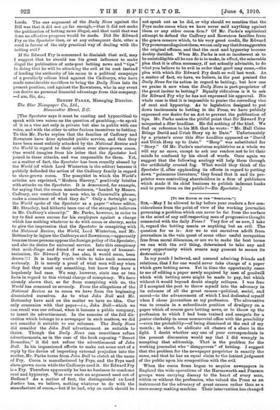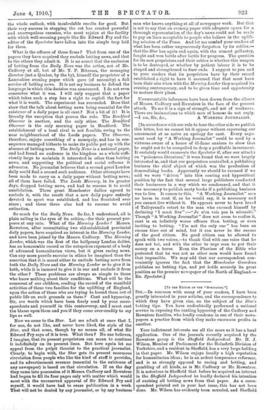[To THE EDTrOB or THE " SPECTATOR?' j SIR,—May I be
allowed to lay before your readers a few con- siderations from the point of view of the working journalist governing a problem which can never be far from the surface in the mind of any self-respecting man of progressive thought connected with the daily Press ? Very few of us now, I take it, regard the betting mania as anything but an evil. The question for us is : Are we to cut ourselves adrift from journalism in the vain quest of some other useful occupation free from moral dilemmas, or are we to make the best terms we can with the evil thing, determined to take any and every opportunity which events may present to secure its destruction ?
In my youth I believed, and assured admiring friends and relations, that I for one would never take charge of a paper which gave betting news. Yet in time the opportunity came to me of editing a paper newly acquired by men of goodwill which with betting news might be made to pay, but which without it would beyond doubt simply collapse. I was free if I accepted the post to throw myself into the advocacy in its columns of all the great causes—political, social, and moral—to the advancement of which I had dedicated myself when I chose journalism as my profession. The alternative was to remain in a subordinate position of drudgery on a paper which of course gave betting news, or to throw up the profession to which I had been trained and compete for a junior clerkship in some commercial office with the possibility —even the probability—of being dismissed at the end of my month ; in short, to abdicate all chance of a share in the fight. I doubt whether any one of your correspondents in the present discussion would say that I did wrongly in accepting that editorship. That is the problem for the working journalist who " disapproves" of betting. I suggest that the problem for the newspaper proprietor is exactly the same, and that he has an equal claim to the lenient judgment of the public upon his composition with the evil.
When the cocoa firms began to acquire newspapers in England the wide operations of the Harmsworth and Pearson groups were carrying dismay to the heart of every man, within or without the profession, who valued the Press as an instrument for the advocacy of great causes rather than as a mere money-making machine. Their intervention has changed
the whole outlook, with incalculable results for good. But their very success in stopping the rot has created powerful and unsc'rupnlous enemies, who must rejoice at the facility with which well-meaning people like Sir Edward Fry and the editor of the Spectator have fallen into the simple trap laid for them.
What is the offence of these firms P That from one of the papers they have acquired they exclude betting news, and that to the others they admit it. It is no secret that the exclusion of betting from the Daily News was the action, not of Mr. Cadbury at all, but of Mr. T. P. Ritzema, the managing director (not a Quaker, by the by), himself the proprietor of a Lancashire evening paper which gave (of necessity) a full service of betting news. It is not my business to defend the language in which this decision was announced. I do not even remember what it was. I will only suggest that a paper which takes such a step has a right to exploit the fact for what it is worth. The experiment has succeeded. Does that show that the talk about betting news being essential for the existence of a daily paper is all cant ? Not a bit of it! It is literally the exception that proves the rule. The Bradford Observer is another, and the only other. The Bradford Observer is the only morning paper in Bradford. The establishment of a local rival is not feasible, owing to the near neighbourhood of the Leeds papers. The Observer, therefore, enjoys something of a monopoly, and has in con- sequence managed hitherto to make its public put up with the absence of betting news. The Daily News is a national paper, and had found an audience in the kingdom as a whole suffi- ciently large to maintain it interested in other than betting news, and supporting the political and social reforms it advocates. No journalist believes that a second great London daily could find a second such audience. Other attempts have been made to carry on a daily paper without betting news; all of them have failed. The Leeds Mercury, in its greater days, dropped betting news, and had to resume it to avoid annihilation. Three great Manchester dailies agreed to exclude it, with the result that a new daily paper entirely devoted to sport was established, and has flourished ever since ; and these three also had to resume to avoid extinction.
So much for the Daily News. So far, I understand, all is plain sailing in the eyes of its critics,—for their present pur- poses at any rate. What of the Morning Leader ? Messrs. Rowntree, after resuscitating two old-established provincial daily papers, have acquired an interest in the Morning Leader, and have been joined by the Messrs. Cadbury. The Morning Leader, which was the first of the halfpenny London dailies, has an honourable record as the outspoken exponent of a body of advanced humanitarian views, but it gives racing news. Can any more puerile exercise in ethics be imagined than the assertion that it is moral either to exclude betting news from both the Daily News and the Morning Leader or to give it in both, while it is immoral to give it in one and exclude it from the other P These problems are always so simple to those who know nothing about their conditions. What will be the comment of our children, reading the record of the manifold activities of these two families for the uplifting of England, upon the action of those who are trying to hound them out of public life on such grounds as these ? Cant and hypocrisy, Sir, are words which have been freely used by your corre- spondents and yourself in this controversy, and I must cast the blame upon them and you if they come over-readily to my lips as well.
Now we come to the Star. Let me admit at once that I, for one, do not like, and never have liked, the style of the Star, and that some, though by no means all, of what Sir Edward Fry says of it is true. What then P No one believes, I imagine, that its present proprietors can mean to continue it indefinitely on its present lines. But here again let me appeal from the pulpit theorist to the practical journalist. Clearly, to begin with, the Star gets its present enormous circulation from people who like the kind of stuff it provides, and its advertisement revenue (essential to the existence of any newspaper) is based on that circulation. If on the day they came into possession of it Messrs. Cadbury and Rowntree had begun to fill its four pages only with matter which would meet with the unreserved approval of Sir Edward Fry and myself, it would have had to cease publication in a week. That will not be denied by any journalist, or by any business man who knows anything at all of newspaper work. But that is not to say that an evening paper with adequate space for a thorough representation of the day's news could not be made to pay on lines acceptable to people who believe in the uplift- ing mission of the Press. And let me remind your readers of what has been rather ungenerously forgotten by its critics,— that the Star has again and again, with the utmost gallantry, fought and won battle after battle for progress. The question for its new proprietors and their critics is whether this weapon is to be destroyed, or whether by patient labour it is to be shaped and strengthened to finer ends. I suggest to you and to your readers that its proprietors have by their record established a right to have it assumed that that must have been their aim when with the Morning Leader they acquired its evening contemporary, and to be given time and opportunity to mature their plans.
Unwarrantable inferences have been drawn from the silence of Messrs. Cadbury and Rowntree in the face. of the present attack. To me it is a sign of strength, and not of weakness. There are insinuations to which men of honour do not reply.
[In accordance with our rule to hear the other side we publish this letter, but we cannot let it appear without expressing our amazement at so naive an apology for cant. Every argu- ment used by " A Working Journalist " could be used by a virtuous owner of a house of ill-fame anxious to show that he ought not to be compelled to drop a profitable investment. It certainly would exonerate the Spectator if, after our attacks on "poisonous literature," it were found that we were largely interested in, and that our proprietors controlled, a publishing business the chief object of which was the production of demoralising books. Apparently we should be excused if we said we were " driven " into this canting and hypocritical position by the fact that several large publishers conducted their businesses in a way which we condemned, and that it was necessary to publish nasty books if a publishing business was to live. It comes to this. "A Working Journalist" sees no harm in cant if, as he would say, it is necessary and you cannot live without it. He appears never to have heard of Talleyrand's retort to the man who excused himself by declaring " I must live" :—" Je n'en vois pas la nocessite." Though "A Working Journalist" does not seem to realise it, cant is an infinitely worse offence than betting, or even inciting to betting. "I'm not the only one" has been an excuse time out of mind, but it can never be the excuse of the good citizen. No good citizen can be allowed to speak with two voices,—to thank God with one voice that he does not bet, and with the other to urge men to put their money on a horse. Even the Pharisee of the Bible who protested that he was not as other men would have found that impossible. We may add that our correspondent con- veniently ignores the fact that the Manchester Guardian publishes no betting tips, and yet holds securely its great position as the premier newspaper of the North of England .—• ED. Spectator.]



















































 Previous page
Previous page